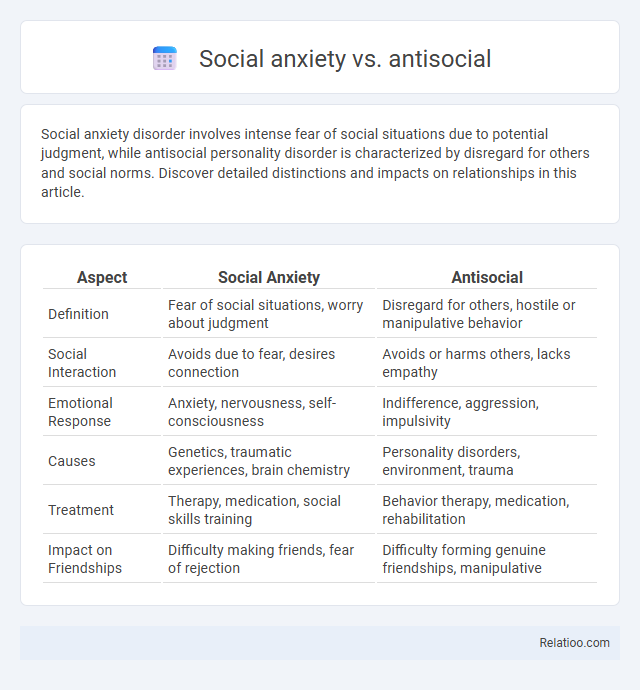Social anxiety disorder involves intense fear of social situations due to potential judgment, while antisocial personality disorder is characterized by disregard for others and social norms. Discover detailed distinctions and impacts on relationships in this article.
Table of Comparison
| Aspect | Social Anxiety | Antisocial |
|---|---|---|
| Definition | Fear of social situations, worry about judgment | Disregard for others, hostile or manipulative behavior |
| Social Interaction | Avoids due to fear, desires connection | Avoids or harms others, lacks empathy |
| Emotional Response | Anxiety, nervousness, self-consciousness | Indifference, aggression, impulsivity |
| Causes | Genetics, traumatic experiences, brain chemistry | Personality disorders, environment, trauma |
| Treatment | Therapy, medication, social skills training | Behavior therapy, medication, rehabilitation |
| Impact on Friendships | Difficulty making friends, fear of rejection | Difficulty forming genuine friendships, manipulative |
Understanding Social Anxiety: Definition and Symptoms
Social anxiety is a mental health condition characterized by intense fear of social situations, leading to avoidance and significant distress, while antisocial behavior involves disregarding others' rights and often violating social norms. Symptoms of social anxiety include excessive self-consciousness, fear of judgment, sweating, trembling, and difficulty speaking in public or social settings. Understanding social anxiety helps You recognize its impact on daily life and seek appropriate treatment to improve social interaction and emotional well-being.
What Does “Antisocial” Really Mean?
Antisocial behavior refers to actions that intentionally harm or disregard the rights of others, often linked to antisocial personality disorder, which is distinct from social anxiety, a condition characterized by intense fear of social interactions. Social anxiety involves your fear of being judged or embarrassed in social settings, whereas being "antisocial" means actively avoiding social norms or engaging in hostile behavior. Understanding this distinction clarifies that antisocial is not simply a dislike of socializing but a pattern of behaviors that negatively impact others.
Key Differences: Social Anxiety vs Antisocial Behavior
Social anxiety is characterized by an intense fear of social situations and being judged, causing significant distress and avoidance, whereas antisocial behavior involves a disregard for others' rights and often includes manipulation or aggression. You experiencing social anxiety typically seek approval and connection despite discomfort, while antisocial individuals may lack empathy and violate social norms without remorse. Understanding these key differences is crucial for accurate diagnosis and effective treatment strategies.
Common Misconceptions and Myths
Social anxiety is often mistaken for antisocial behavior, but it primarily involves intense fear of social situations rather than a desire to avoid others. Common misconceptions include the belief that individuals with social anxiety are simply shy or unfriendly, while myths about antisocial personality disorder wrongly portray affected people as merely introverted. Understanding these distinctions helps your awareness and promotes accurate support for those experiencing social anxiety or antisocial tendencies.
Causes and Risk Factors of Social Anxiety
Social anxiety primarily stems from a combination of genetic predisposition, environmental influences such as childhood trauma, and learned behavior from social experiences. Risk factors include a family history of anxiety disorders, low self-esteem, negative social interactions, and significant stress during developmental years. Unlike antisocial behavior, which is characterized by disregard for others' rights often linked to conduct disorders, social anxiety centers on intense fear of social judgment and embarrassment.
Origins and Triggers of Antisocial Traits
Antisocial traits often stem from complex origins such as genetic predispositions, early childhood trauma, and dysfunctional family environments, leading to difficulties in empathy and social norms adherence. Triggers for antisocial behavior may include stressful situations, social rejection, or substance abuse, which can exacerbate impulsivity and aggressive tendencies. Unlike social anxiety, which is characterized by fear of social judgment and avoidance, antisocial traits involve deliberate disregard for others' rights and a propensity for manipulation or hostility.
Impact on Daily Life and Relationships
Social anxiety primarily impairs Your ability to engage comfortably in everyday social interactions, causing intense fear of judgment and avoidance of social situations. Antisocial behavior, linked to personality disorders, often results in disregard for others' rights, leading to conflicts and strained or harmful relationships. Understanding these distinctions helps tailor effective strategies to improve social functioning and relationship quality.
Diagnosis: How Professionals Differentiate the Two
Professionals differentiate social anxiety disorder and antisocial personality disorder by evaluating symptoms, with social anxiety characterized by intense fear of social interactions and scrutiny, whereas antisocial personality involves a pervasive disregard for others' rights and social norms. Diagnosis of social anxiety focuses on avoidance behaviors, excessive self-consciousness in social situations, and physical symptoms like sweating or trembling, typically assessed via clinical interviews and standardized scales such as the Social Phobia Inventory (SPIN). In contrast, antisocial personality disorder diagnosis requires evidence of a long-term pattern of manipulative, deceitful, or aggressive behavior starting in adolescence, assessed through tools like the Structured Clinical Interview for DSM-5 Personality Disorders (SCID-5-PD).
Treatment Options and Coping Strategies
Treatment options for social anxiety include cognitive-behavioral therapy (CBT), selective serotonin reuptake inhibitors (SSRIs), and mindfulness techniques, which help reduce fear of social situations. Antisocial personality disorder treatment often involves long-term psychotherapy, such as cognitive behavioral therapy tailored to managing impulsivity and improving interpersonal skills, though medication effectiveness is limited. Coping strategies for social anxiety emphasize gradual exposure to social settings, relaxation exercises, and building social skills, while managing antisocial tendencies focuses on behavioral interventions and developing empathy through structured therapy programs.
Seeking Help: When and Where to Start
Seeking help for social anxiety involves consulting mental health professionals such as therapists or counselors who specialize in anxiety disorders, enabling you to develop coping strategies and improve social skills. In contrast, antisocial behavior often requires intervention from psychologists or psychiatrists trained in personality disorders, sometimes necessitating more comprehensive treatment plans including therapy and medication. Recognizing when your social discomfort exceeds typical anxiety symptoms and impacts daily interactions is crucial to determine if professional support is needed, with options ranging from community mental health centers to private clinics.

Infographic: Social anxiety vs antisocial
 relatioo.com
relatioo.com